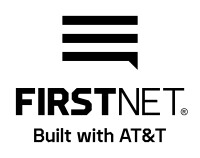Content provided by FirstNet, built with AT&T
By Kelley Adley
Former criminal investigator/Licensed officer
Director, Strategy and Policy
FirstNet Program at AT&T
Over my years in law enforcement, I’ve come to appreciate the importance of reliable communication. I started my career with Euless Police Department, then moved to Dallas Area Rapid Transit and later the
Dallas District Attorney’s Office as an investigator. And I’m still a licensed officer.
I had friends who lost their lives in the line of duty. So, if I can be a part of innovative technology that can help keep others safe, then I’m going to be all in.
The quicker we can relay information to first responders, the quicker they’re able to help the public and themselves. Whether it’s a child abduction, active shooting, officer or firefighter down, we want to deliver that information in real time.
A child abduction is a prime example. Once you get that photograph of the child, you have to hit the entire region with that picture. And you’re sending different information to first responders than what you give to the public, so you want that information to be secure.
HERE ARE THE 5 THINGS YOU ABSOLUTELY NEED WHEN DISASTER STRIKES.
1. Reliable communications: When you’re out in the field, you need to know your communications are going to work. Communication with incident command and fellow officers is critical.
2. Interoperability: When you’re responding to an incident, you need to be able to communicate across agencies, jurisdictions and state lines. The 2016 shooting in downtown Dallas – in which a shooter opened fire, killed five officers and injured nine others – crystallized for me the need for a network that delivers interoperability.
I had friends on the scene that day. You had officers from Dallas Police Department, Dallas Area Rapid Transit and the Dallas County Sheriff’s Department responding. But they were all on different networks, which kept them from talking to each other. And now you have an interoperability problem.
3. Situational awareness: You need a clear picture of what is happening on the scene and with your teams. You need to know where they are, whether they need backup and that they’re safe. Most importantly, you need a good holistic view of the situation so you can make informed decisions.
4. Portable cell sites to keep you connected: In disaster areas, where power lines and cell towers may be down, you need to be able to connect so you can coordinate your search and rescue efforts, move people out of harm’s way and keep track of your teams.
5. A reliable network: Finally, you need to know all of these tools are going to work together so you can focus on the important life-saving information. You shouldn’t have to worry that commercial networks will be so congested you can’t reach your teams. First responders carry many items on their toolbelt – whether you’re a law enforcement officer, firefighter, EMT/paramedic, 911 dispatcher or ER doctor. But the most important – and one they all have in common – is their communications device. Your devices should work when and where you need them. Period.
Now here’s why I think you can address all 5 of those needs with FirstNet. FirstNet is the only network built with and for first responders with solutions to address your most critical needs.
With FirstNet, you get access to:
- Highly secure, prioritized connectivity – never competing with commercial traffic.
- Band 14 spectrum is set aside just for public safety. This is public safety’s VIP lane, which we can clear and lock it just for first responders and the extended public safety community. That’s unique in the industry and something you will only get on the FirstNet network.
- 150+ dedicated portable cells on wheels that don’t rely on commercial power – all equipped with Band 14 capability – to keep you connected.
- Mission-critical devices – to help enhance situational awareness with mission critical data, messaging, video and location services.
- The FirstNet Response Operations Group – a dedicated team of former first responders with decades of experience in public safety who understand your needs. They’ll work with your agency during a critical event or natural disaster to identify and deploy the best solution based on your situation.
Check it out for yourself. Give us a call and we’ll get you set up.
ABOUT THE AUTHOR
Kelley Adley is the Director of Strategy and Policy with the FirstNet Program at AT&T. He is a licensed officer who spent 20 years in law enforcement, including in Euless, Texas, and with Dallas Area Rapid Transit. He served as a criminal investigator for the Dallas County District Attorney’s Office and most recently as a Special Crimes Investigator with the Collin County District Attorney’s Office. Adley joined the FirstNet Program at AT&T in June 2017 and is a member of the FirstNet Response Operations Group.













